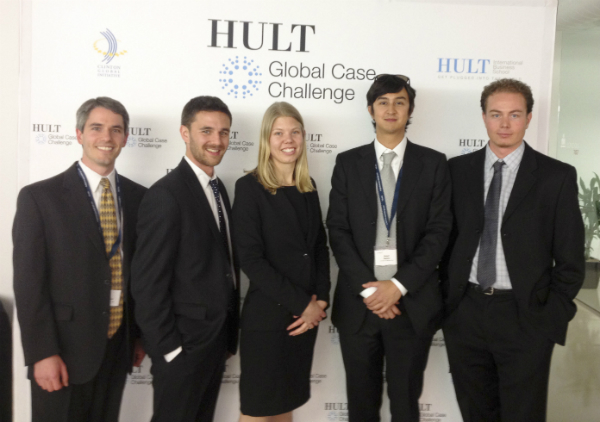Co-written by Adam Baillie, David Fisher, Emma VanGenderen, and Evan Howell
Want to fight poverty? Give someone a stage.
Ask a young person today, "How can you make the world a better place?"
Few will reply, "Go to business school!"
We hope to change that. We are five MBA students at the UC Davis Graduate School of Management. And we've spent the last eight weeks thinking about one thing above all else: fighting poverty.
You were expecting hedge funds, perhaps?
It turns out that "how to change the world" is exactly what business schools teach. Whether that's for better or for worse, of course, depends on what students do with that knowledge. In our case, it's reinventing the way the world's poorest families light their homes.
Our team is one of six finalists in the Hult Global Case Challenge on Energy. Later this month, we will present our plan to revolutionize the solar lighting business in rural Africa to some of the world's business, political, and social change leaders. If we win, the British nonprofit SolarAid will receive $333,000 to pilot test our business model.
Here's the challenge: right now, in rural Africa, nearly 600 million people can't flip on the light switch when it gets dark. They have no electricity. Instead, they burn dirty and expensive candles, kerosene lamps, or worse.
Just try and imagine what that would do to your family's life. No working past dusk. No homework after dinner. And no clean air to breathe while anyone needs a light.
There are good alternatives, for those who can afford them. SolarAid already sells well-designed solar-powered lanterns. But for the rural poor, even the cheapest can cost half a month's wages, and costs more than they spend in several months on lamp fuel.
Yes, other people know more than we do. About poverty, about solar panels, and about Africa. But we have other things going for us, including a fresh perspective and a chance to share our ideas on a big stage.
Our proposed solution begins with re-inventing the solar lantern. Actually, "breaking it" would be a better description. We remove the solar panel, the charging circuit, and the battery. Together, these account for 70 percent of the cost. A quality lantern would cost $3 instead of the current $10 or more.
Next, we need to get electricity for the lanterns. So we propose SolarAid set up solar-powered charging shops in rural villages -- first in Kenya, then hopefully across the continent. Collecting sunlight in one charging station is far more efficient than doing it piecemeal. What's more, each lantern doesn't need to sit outside all day where it can get broken, stolen, or rained on.
The shop charges enough batteries for the whole village. When a customer buys a lantern, the shopkeeper lends a fully-charged battery for free. Three days later, the customer brings back the depleted battery. The shop exchanges it for a freshly charged one for 15-20 cents. That's less than half of what many Kenyans pay for three days of kerosene.
Why would a customer come to this shop? Because we're not just charging lantern batteries, we also charge cell phones.
More than half of Kenyans own cell phones, even though many can't charge them at home. Some regularly travel three hours by bus just to charge their phone. And they pay 20 or more cents for that privilege. That's $40 per kilowatt-hour, which is more than 200 times what we pay here in the States! At our shop, Kenyans can charge their phone locally and for less money. (Shout out to mobile carriers: we're accepting sponsors!)
As you might guess, our idea can be profitable. Once one charging shop pays for itself, we'll use the profits to build the next one in another village. This sustainable business model can save customers money, improve their lives, and replace environmentally harmful kerosene consumption. It's a win for customers, a win for the environment, and a win for SolarAid.
Of course, everything won't work exactly as we expect. But thanks to feedback from NGO workers, researchers, marketing experts, management consultants, solar engineers, and industrial designers, we're ready to respond to problems as they arise.
If we win the final competition on April 26, we'll have enough money to fund a six-month pilot program in Kenya, where SolarAid already operates. We'll experiment with pricing, ownership models, promotions, and more to fine tune the concept.
This business model needs to be tested. Six hundred million people in Africa are waiting for a cleaner, brighter, more affordable solution. And for the hundreds of millions who currently can't afford a solar-powered lantern, we have a new way to deliver light.
This story is about more than rechargeable batteries and solar lanterns. It's about what happens when an organization puts resources and prestige behind a good cause. Lots of people across this planet have the skills, the ideas, and the dedication to fight poverty. Many do every day, in powerful and personal ways. But what would happen if someone gave them a microphone and a stage?
That's where you come in. If you're in a position of power -- in a business, a government, a school, or maybe just your family -- ask someone how we can do better. Give their ideas a stage.
We think you'll be surprised by what they can do to make our world a better place. Even if they happen to be in business school.

Keith Weissglass, Adam Baillie, David Fisher, Emma VanGenderen, and Evan Howell are MBA students at the UC Davis Graduate School of Management. They can be reached via Twitter @GSMCaseTeam.